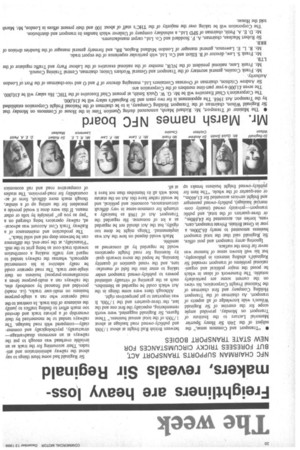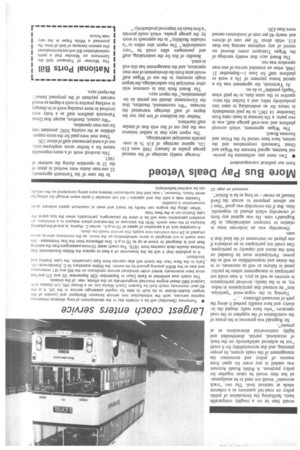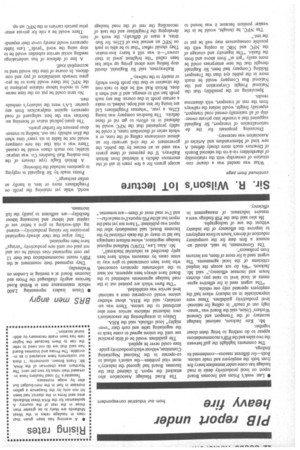Freightliners are heavy loss makers, reveals Sir Reginald
Page 22

Page 23

Page 24

If you've noticed an error in this article please click here to report it so we can fix it.
NFC CHAIRMAN SUPPORTS TRANSPORT ACT, BUT FORESEES TRICKY CIRCUMSTANCES FOR NEW STATE TRANSPORT BODIES
• "Transport and Common sense," the subject of the 24th Sir Henry Spurrier Memorial Lecture to the Institute of Transport on Monday, provided ample scope for the exercise of Sir Reginald Wilson's wide knowledge of all aspects of transport. As chairman of the Transport Holding Company and first chairman of the National Freight Corporation, his views on the current scene are particularly notable. The framework of ideas in which he posed the major political and organizational problems of transport revealed Sir Reginald's abiding interests in philosophy, but his well known sense of humour was never far from the surface.
Ignoring,army transport and post office, Sir Reginald said that the total transport business amounted to nearly £6,200m. a year in Great Britain. Private transport, cars, vans, lorries etc. accounted for £.4,680m., or three-quarters of the total, and public transport—privately owned (mainly commercial haulage), publicly-owned passenger and freight services accounted for 1,460m., or one-quarter of the whole. "The item for publicly-owned freight business breaks up between British Rail freight at about 1/30th and publicly-owned road haulage at about 1 /70th of the total annual business." These figures, Sir Reginald suggested, were worth remembering, especially the first one and the last, the three-quarters and the 1 /70th. It was important to get perspectives right.
Although there were some things in the Act which could be regarded as blemishes, such as the granting of virtually unlimited powers to publicly-owned transport under taking to enter into the field of manufacture, and the vexed question of quantity licensing, he hoped the move towards quality licensing for road freight operations would be regarded by all concerned as sensible.
Much would depend on how the Act was implemented. Things might be done too rigidly, but the Act should not be regarded as a lot of nonsense. He regarded the Transport Act of 1968 as basically a triumph for common-sense in very difficult circumstances, economic and political, and he would rather have this Act on the statute book with all its blemishes than not have it at all. Sir Reginald had some blunt things to say about the railway administration and attitudes. Their accounting for the track as an invisible overhead was enough to put the railways at an enormous disadvantage— structurally, psychologically and commercially—compared with road haulage. The railways tended to be mesmerized by their ownership of a private track and devoted too much effort to finding traffics to justify the existence of this track. In contrast to the road operator who ran a single-purpose business on multi-user tracks, (i.e. roads) provided and financed by somebody else, the railways ran a multi-purpose (even a miscellaneous-purpose) business on their single-user track. The road operator could be really selective in his commercial approach, whereas the railways tended to regard any traffic making a contribution towards track-cost as being grist to the mill. "Financially, at the year-end, the difference can be between deep red and solid black."
The production and maintenance of a Railway Track Cost Account was advocated, railway operators being charged on a "pay as you go" principle by tolls or other means. If this were done it would provide a precedent for the setting up of a similar, though much more difficult, form of accountability for road-provision. The studies of comparative road and rail economics would then be on a roughly comparable basis, facilitating the formulation of public policy on road-rail questions as a coherent whole at national level. The two "track accounts" would not need to be amalgamated but they would be taken together for policy purposes. A Public Roads Account was needed in any event for apart from reasons of policy and economics the management of the roads system, its proper planning, and due 'accountability for it could "not be achieved satisfactorily on the basis of occasional, partial, disembodied and highly controversial abstractions as at present".
Sir Reginald was generous in his praise of the contribution of the suppliers to the road operators "who have really shaped the industry and have steadily pushed it along the path of increased efficiency ..."
Turning to the vogue-word "participation" he stressed that participation in industry, as in the family, involved participation in sorrows as well as joys. A man could not participate in management unless he participated in failures as well as successes, or in the duties and responsibilities as well as the power. Participation must be founded on both the desire and capacity to participate. One could not participate in an orchestra if one played no instrument of the kind that it uses.
Ownership was an irrelevant issue in relation to transport undertakings, in Sir Reginald's view. He was against any form of ownership which abused its responsibilities. But if the ownership was good "then I am almost prepared to accept the Devil himself as owner—so long as he is British".
What was needed was a clearer constitution of ownership with the relationship of shareholders vis-a-vis the selected Boards of Directors much more closely defined. A new kind of Memorandum and Articles of Association was necessary.
Discussing proposals for the denationalization of transport, Sir Reginald suggested that a transfer into private ownership of all nationally-owned road transport, especially freight, would isolate the railways from the rest of transport, with disastrous results.
Speculating on the possibility that the National Freight Corporation and the National Bus Company would be much more in the public eye than the Transport Holding Company had been, Sir Reginald thought that the new enterprises could be more easily "got at" from above and from the flanks. "The ingenuity and courage of the NFC and NBC in coping with the possible consequences may well be put to the test."
The NFC, he thought, would be in the weaker position because it was bound to accept grants for a few years in aid of the enormous deficits it inherited from British Railways. If the payment of these grants was used as an excuse by the public, the government or the civil servants for an almost continuous calling of the tune, or a whole series of discordant tunes, it could be safely prophesied that the NFC would be defeated in its efforts to get rid of these deficits. The Sundries company was losing £25m. a year, "whereas Freightliners Ltd are losing far less and hope, indeed, to make a certain profit in due course. But any such profit has still to emerge, and if and when it does, British Rail will be able to rack-rent the situation so that this profit flows wholly or mainly to the railway."
Railwaymen, said Sir Reginald, should stop feeling sore about giving up what has been called "the brightest jewel in their crown"—it was still a heavy loss-maker. They should reflect "that to be able to park on NFC an annual loss of £25m. for Sundries, a mass of difficulty, the work of developing the Freightliner and the task of reconciling the rest of the road haulage world, while yet retaining the profit on Freightliners more or less, is hardly an unfair exchange".
Points made by Sir Reginald in replying to questions included the following: A British Eagle type closure of the loss-making Rail Sundries Co. was impracticable; too much chaos would be caused. There was a risk that the new company would not be liable in six years' time when the £6m subsidy ran out, leading to tremendous pressure for further grants.
The quasi-judicial status of licensing authorities was the best safeguard of road operators against malpractices from any quarter. LA's were the industry's ombudsmen.
No term could be put on the time necessary to resolve labour relation problems in the NFC but there would have to be progress towards assimilation of pay and conditions. In course of time this would tend to accomplish itself.
A line of defence of bus undertakings needing social service subsidies would be to stop using the word "profit". Less liable operators would merely cover their expenditure.
There would be a role for private enterprise parcels carriers in the NFC set-up.












































































































